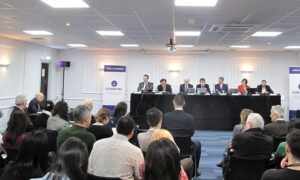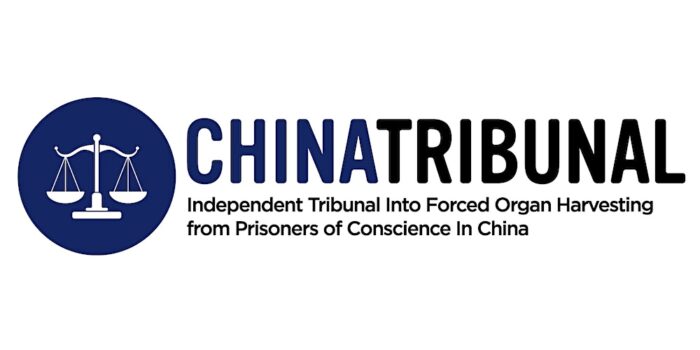Human Rights Lawyer Decries Chinese Regime’s Attempt to Suppress Reporting on Forced Organ Harvesting
An international human rights lawyer has decried the Chinese regime’s efforts to smear reporting on Beijing’s forced organ harvesting of prisoners of conscience.After Italian magazine Panorama published a piece on Aug. 24 titled “China: When the State Wants Your Organs,” the Chinese Embassy in the country publicly accused the publication of plagiarism and called on other Italian media outlets to “eliminate” the articles. Panorama hit back at the embassy’s claims, publishing another piece citing more evidence of the Chinese regime’s grisly practices. Applauding Panorama for not backing down, international criminal lawyer Eleanor Stephenson called the embassy’s response “abusive, inadequate, and misleading.” Stephenson is a barrister in England and Wales, and currently works for an international criminal tribunal in The Hague, Netherlands. She is a legal officer at the International Coalition to End Transplant Abuse in China (ETAC), an advocacy group that in 2018 initiated the China Tribunal, an independent panel of lawyers, medical professionals, human rights advocates, and other experts tasked to investigate forced organ harvesting in China. China Tribunal The China Tribunal, based in London, was chaired by noted human rights lawyer Sir Geoffrey Nice KC, who served as lead prosecutor in the war crimes trial of Yugoslav leader Slobodan Milošević. In its final judgment, dated June 2019, the tribunal concluded that “forced organ harvesting has been committed for years throughout China on a significant scale and that Falun Gong practitioners have been one—and probably the main— source of organ supply.” The China Tribunal logo (Chinatribunal.com/Screenshot via The Epoch Times) The Chinese Embassy in the UK at the time responded to the tribunal’s findings, calling it a show trial while claiming Nice was a “notorious expert in the abuse of lawsuits in the international human rights circle.” It provided no evidence for either accusation in its statement. Stephenson, in an email to The Epoch Times on Sept. 22, said the embassy’s response should be dismissed because it provided no evidence to support its assertions. “The China Tribunal was an independent people’s tribunal that examined a wide range of evidence related to forced organ harvesting over the course of 12 months,” Stephenson wrote. “They questioned over 50 fact witnesses, experts, investigators, and analysts over 5 days of public hearing between December 2018 and April 2019. The China Tribunal reviewed written submissions, investigative reports, and academic papers and received expert legal advice on relevant international law, including in relation to core international crimes (crimes against humanity and genocide).” The China Tribunal’s judgment states that China’s commission of crimes against humanity “has been proved beyond reasonable doubt.” It warns that “governments and any who interact in any substantial way” with China should recognize that they are “interacting with a criminal state.” Beijing Ignored Invite to Participate in China Tribunal For well over a decade, the Chinese regime has vehemently denied that it has engaged in forced organ harvesting, while refusing independent investigators access to its transplant system and data. Stephenson noted that “the government of China were asked to participate in the China Tribunal on 5 occasions, but no reply was ever received to the invitations.” “Despite cogent evidence of forced organ harvesting of the Falun Gong and other persecuted groups, China appears unwilling and or unable to provide any evidence to rebut the obvious inferences of widespread and systematic forced organ harvesting in China … Presumably if the government of China had some evidence relating to forced organ harvesting which could allay the widespread concerns it would have provided it at one of the many opportunities it has had to do so.” She added, “Protestations of innocence without evidence can themselves be incriminating.” The Chinese embassy insisted that “the human rights of people of all ethnic groups in Xinjiang are fully protected and there is no ‘genocide’ or ‘crimes’ against humanity.” Uyghur Tribunal The International Criminal Court is the world’s first permanent international court, an international tribunal charged with prosecuting individuals for crimes of genocide, crimes against humanity, war crimes, and aggression. However, China did not sign the United Nations treaty governing the International Criminal Court, therefore the ICC’s prosecutors have no jurisdiction in China. For this reason, independent tribunals such as the China Tribunal play an important role in investigating the Chinese regime’s rights abuses. Another such tribunal is the Uyghur Tribunal, which Stephenson cited as “an independent people’s tribunal established in September 2020 to investigate ‘ongoing atrocities and possible Genocide’ against the Uyghur, Kazakh, and other Turkic Muslim populations.” The Uyghur Tribunal’s fi

An international human rights lawyer has decried the Chinese regime’s efforts to smear reporting on Beijing’s forced organ harvesting of prisoners of conscience.
After Italian magazine Panorama published a piece on Aug. 24 titled “China: When the State Wants Your Organs,” the Chinese Embassy in the country publicly accused the publication of plagiarism and called on other Italian media outlets to “eliminate” the articles.
Panorama hit back at the embassy’s claims, publishing another piece citing more evidence of the Chinese regime’s grisly practices.
Applauding Panorama for not backing down, international criminal lawyer Eleanor Stephenson called the embassy’s response “abusive, inadequate, and misleading.”
Stephenson is a barrister in England and Wales, and currently works for an international criminal tribunal in The Hague, Netherlands. She is a legal officer at the International Coalition to End Transplant Abuse in China (ETAC), an advocacy group that in 2018 initiated the China Tribunal, an independent panel of lawyers, medical professionals, human rights advocates, and other experts tasked to investigate forced organ harvesting in China.
China Tribunal
The China Tribunal, based in London, was chaired by noted human rights lawyer Sir Geoffrey Nice KC, who served as lead prosecutor in the war crimes trial of Yugoslav leader Slobodan Milošević.
In its final judgment, dated June 2019, the tribunal concluded that “forced organ harvesting has been committed for years throughout China on a significant scale and that Falun Gong practitioners have been one—and probably the main— source of organ supply.”

The Chinese Embassy in the UK at the time responded to the tribunal’s findings, calling it a show trial while claiming Nice was a “notorious expert in the abuse of lawsuits in the international human rights circle.” It provided no evidence for either accusation in its statement.
Stephenson, in an email to The Epoch Times on Sept. 22, said the embassy’s response should be dismissed because it provided no evidence to support its assertions.
“The China Tribunal was an independent people’s tribunal that examined a wide range of evidence related to forced organ harvesting over the course of 12 months,” Stephenson wrote. “They questioned over 50 fact witnesses, experts, investigators, and analysts over 5 days of public hearing between December 2018 and April 2019. The China Tribunal reviewed written submissions, investigative reports, and academic papers and received expert legal advice on relevant international law, including in relation to core international crimes (crimes against humanity and genocide).”
The China Tribunal’s judgment states that China’s commission of crimes against humanity “has been proved beyond reasonable doubt.” It warns that “governments and any who interact in any substantial way” with China should recognize that they are “interacting with a criminal state.”
Beijing Ignored Invite to Participate in China Tribunal
For well over a decade, the Chinese regime has vehemently denied that it has engaged in forced organ harvesting, while refusing independent investigators access to its transplant system and data.
Stephenson noted that “the government of China were asked to participate in the China Tribunal on 5 occasions, but no reply was ever received to the invitations.”
“Despite cogent evidence of forced organ harvesting of the Falun Gong and other persecuted groups, China appears unwilling and or unable to provide any evidence to rebut the obvious inferences of widespread and systematic forced organ harvesting in China … Presumably if the government of China had some evidence relating to forced organ harvesting which could allay the widespread concerns it would have provided it at one of the many opportunities it has had to do so.”
She added, “Protestations of innocence without evidence can themselves be incriminating.”
The Chinese embassy insisted that “the human rights of people of all ethnic groups in Xinjiang are fully protected and there is no ‘genocide’ or ‘crimes’ against humanity.”
Uyghur Tribunal
The International Criminal Court is the world’s first permanent international court, an international tribunal charged with prosecuting individuals for crimes of genocide, crimes against humanity, war crimes, and aggression. However, China did not sign the United Nations treaty governing the International Criminal Court, therefore the ICC’s prosecutors have no jurisdiction in China.
For this reason, independent tribunals such as the China Tribunal play an important role in investigating the Chinese regime’s rights abuses.
Another such tribunal is the Uyghur Tribunal, which Stephenson cited as “an independent people’s tribunal established in September 2020 to investigate ‘ongoing atrocities and possible Genocide’ against the Uyghur, Kazakh, and other Turkic Muslim populations.” The Uyghur Tribunal’s findings echoed those of the China Tribunal. It heard from 70 witnesses over two sets of hearings in London in June and September of 2021, and provided its judgment on Dec. 9, 2021.
In its judgment (pdf), the Uyghur Tribunal found the Chinese Communist Party (CCP) guilty of torture, crimes against humanity, and genocide against the Uyghurs in Xinjiang.
Stephenson said: “There is clear and compelling evidence of forced organ harvesting ongoing across China including in the Xinjiang region. The response from the government of China is nothing more than evasion.
“Rather than engaging in the remaining hyperbole and rhetoric of the response, the international community renews its repeated and very reasonable request that the CCP should engage constructively in providing uncensored and transparent access to China’s transplant and organ donation activity data. They should permit independent international inspections as is the case with other countries.”
European Parliament Condemns Forced Organ Harvesting
On May 5, 2022, the European Parliament adopted a resolution on reports (pdf) on continued organ harvesting in China condemning the forced removal of organs from Falun Gong practitioners and expressing concerns regarding Uyghurs.
Multiple members of the European Parliament, including Hilde Vautmans (Belgium), Seán Kelly (Ireland), Miriam Lexmann (Slovakia), and Fabio Massimo Castaldo (Italy) spoke, condemning the CCP’s practice of forced organ harvesting and asking the regime to provide full transparency on its organ donation and transplant system.
Finland’s Jutta Urpilainen has served as the European Commissioner for International Partnerships since 2019. In her speech, Urpilainen said “we will seize every opportunity, including at the highest political level, to raise serious concerns about the human rights situation in China. Doing so is becoming even more important as multiple reports continue to provide very credible evidence of organ harvesting in China.
“The EU condemns in the strongest possible terms the criminal, inhuman and unethical practice of forced organ harvesting.”













